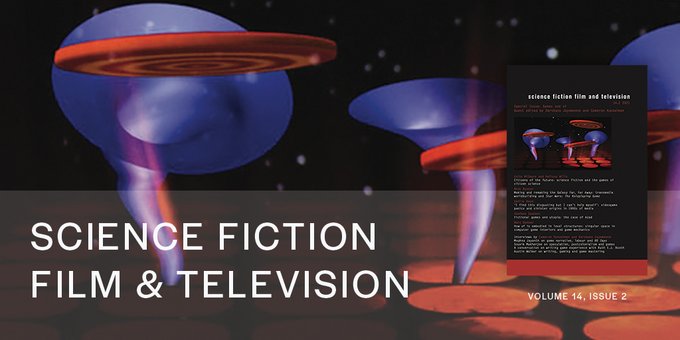If you’d like some insights into my work-in-progress, now’s your chance. This month’s Science Fiction Film & Television journal is a special issue on Science Fiction and Gaming. Editors Darshana Jayemanne and Cameron Kunzelman were kind enough to interview me on ‘Retellings and Reversions’, where we discuss representing gaming in novels and the issues around remakes such as Final Fantasy VII: Remake (on that note, this interview and this blog do contain spoilers).
It was a particularly unusual experience for me, not least because we were discussing a story before it’s been finished. No author wants to give the game away on a tale before its been released. Who knows how the final story will turn out? And all of us harbour a secret nightmare – having almost finished our grand opus, the big idea that will change the world, we check Twitter – only to find some famous author has got there first. Our own unique voice be damned. Mr Award-Winning-Fancy-Pants-Guy has always done it ten times better.
This reminds me of something that didn’t make the final edit of the interview (and quite understandably so). We were talking about Final Fantasy VII: Remake and what we could learn from its mixed reception from fans, when the topic of managing expectations came up.* When you see the word “remake”, that’s what you expect: a straight graphical update with some gameplay tweaks on top. We also talked about John Stephens and Robyn McCallum, and their distinction between story adaptations that are “retellings”, sticking closely to the original story, and “reversions”, which revise major aspects of the story. Final Fantasy VII: Remake definitely falls into the reversion category, almost giving the lie to the word “remake”. But if Square Enix had shown their hand a little earlier, changing the title of Final Fantasy VII: Remake to something more, well, obvious, would it have reduced the ire?
Jesse Cox’s Let’s Play of Final Fantasy VII: Remake is undoubtedly my favourite so far – not just for his jovial personality and familiarity with the series, but the way he discusses and reacts to plot changes as the game goes on. Through Jesse’s eyes, we see how Square Enix subtly wove in the narrative changes to the main storyline. When Jesse realises that Aerith sounds like she’s talking to the player when they switch characters, this changes his entire perspective on some of the alternative cut-scenes, and sends his curiosity sky-rocketing. From Jesse’s reactions, it’s clear that the impact of the big reveal at Shrinra headquarters, the climactic battle, and the divisive closing scenes rely on the player slowly uncovering little clues as they go along. Without that, the resonances of the big reveals would be missing – the joys of putting together those puzzle pieces, gone.
My own feelings on the Remake are clear – Darshana Jayemanne and I have been working on an academic paper on the metafiction of Final Fantasy VII: Remake, and I love the way the changes to the game simultaneously reflect changes in climate change discourse and serve as reflections on fan expectations. I know not everyone feels the same way, and I understand why many were disappointed or felt deceived. But I think that the path that Square Enix took was not only necessary, but vital for this narrative to land, and land hard in the mind of its audience. To fully comment on climate change, fan expectations – the next context of the story – Final Fantasy VII: Remake needed us to discover those changes for ourselves. To slowly uncover what was “wrong” for the story to feel so right.
If you’d like to real more of Science Fiction Film & Television‘s Special Issue on Videogames and Science Fiction (Vol. 14, Issue 2 – June 2021), all the interviews are available to read for free right now. Meanwhile the full issue is available from Liverpool University Press (liverpooluniversitypress.blog).
* For more on this, see the interview itself.

